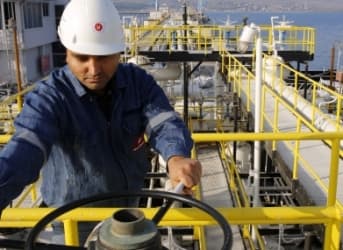The massive Leviathan gas field was discovered in Israel’s offshore Levant Basin over six years ago, and while it theoretically puts Israel on the global energy map for the first time and could change the geopolitical dynamics of the entire Middle East, the Israelis themselves seem to be doing everything in their power to keep it from coming online. Its owners—U.S.-based Noble Energy and Israeli partner Delek Group—along with their shareholders are probably wondering if gas is ever going to come out of this giant of giants.
At stake is a massive gas field worth $5-$6 billion and believed to contain some 22 trillion cubic feet of gas, slated to begin extraction by 2019.
The latest disappointment came this weekend when the Israeli High Court dealt another serious blow to the project with a ruling that promises to cancel the offshore gas extraction deal entirely in a year if a clause in the natural gas rules isn’t changed or voided.
At issue is a 10-year guarantee that the Israeli government gave Noble and Delek for Leviathan. The Israeli court ruling essentially invalidates that clause, with the judiciary saying that the government did not have the right to make a concession of this length to the partners.
It’s called a “stability clause”, and the court now says that the government has to come up with some other way to provide stability, noting that a decade is too long to commit to something without having the authority to make any regulatory changes. Related: China And India Rewrite The Rules Of The Oil And Gas Game
“We have decided to cancel the gas deal because of the stability clause” that would have barred future governments from altering the deal, the High Court panel said, according to the Times of Israel.
More specifically, the High Court of Justice judges wrote, "The stability clause has been set without authority and its legality is repealed. This is because it has been passed in contradiction to the basic rules of administrative law in a way that prohibits restricting the considerations of the (Antitrust) Authority."
What does it mean going forward? Well, it means nothing is going to go forward quickly. The High Court has for now suspended the clause and given the Israeli Knesset (parliament) a year to find an alternative. In the best-case scenario, we’re looking at a delay of at least two months as everyone haggles over an alternative stability clause. In the worst-case scenario, a deal is never reached, and Israeli gas never makes its way out of the sea bed.
It’s a major defeat for Noble and Delek, and for Israeli Prime Minister Benjamin Netanyahu, who has been one of Leviathan’s biggest cheerleaders.
According to Noble, which has been fighting an uphill battle here and antimonopoly sentiments since it discovered Leviathan, the court’s ruling puts the development of Leviathan at great risk. Related: Oil Prices Beyond WTI And Brent
“Development of a project of this magnitude, where large investments are to be made over multiple years, requires Israel to provide a stable investment climate,” Noble CEO David Stover said in a statement, vowing to “vigorously” defend asset rights and protect shareholder interests.
“It is now up to the government of Israel to deliver a solution that at least meets the terms of the Framework, and to do so quickly,” Stover added.
Netanyanu, for his part, found the court ruling ‘’mystifying’’ and ‘’bizarre”, and warned that it threatened the development of the country’s gas reserves.
“Surely nobody can celebrate the fact that the gas is likely to remain in the depths of the sea and that hundreds of billions of shekels won’t reach the citizens of Israel,” he was quoted as saying.
For Israel, Leviathan could mean energy self-sufficiency, and plenty of tax revenue. But this much gas could also play a major geopolitical role; it could buy better relations for Israel in the region. And in this respect, it is priceless. For starters, Israel would sell its gas to Egypt, Jordan and Turkey. Related: Low Oil Prices Forcing Saudi Arabia To Modernize Economy
For Noble, last December seemed like a bit of a coup finally, when Netanyahu managed to get a deal signed so Noble and Delek could actually begin development work. The deal would have reportedly seen the partners invest $1.5 billion to develop the field over the next two years, with the government allowed to back out of the commitment if the partners failed to meet this requirement, but it would not have been able to change fiscal or regulatory terms for the gas industry until 2025.
ADVERTISEMENT
Earlier this month, sources said the partners were in active talks to raise up to $4 billion to fund up to 65 percent of the giant gas field’s development.
While opposition says the deal lacks transparency and is too favorable to Noble and Delek, solidifying a monopoly in the local gas market—the latest ruling risks derailing the project entirely, in which case there would be no winners, only losers.
Noble owns 40 percent of the field, while Delek owns 45 percent through two different units. Noble shares were down 6 percent-7 percent in early trading today on the news.
By Charles Kennedy for Oilprice.com
More Top Reads From Oilprice.com:
- Oil Majors Only Replace 75% of Oil and Gas Produced in 2015
- Oil Prices Fall Slightly On Bearish Fundamentals
- ExxonMobil To Strike Biggest Deal Since Oil Bust Started


















